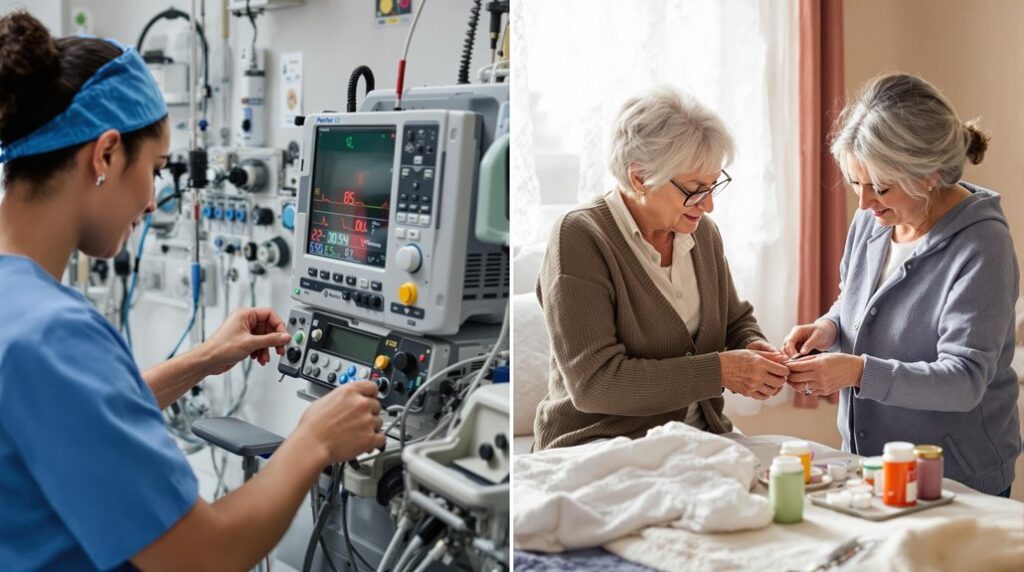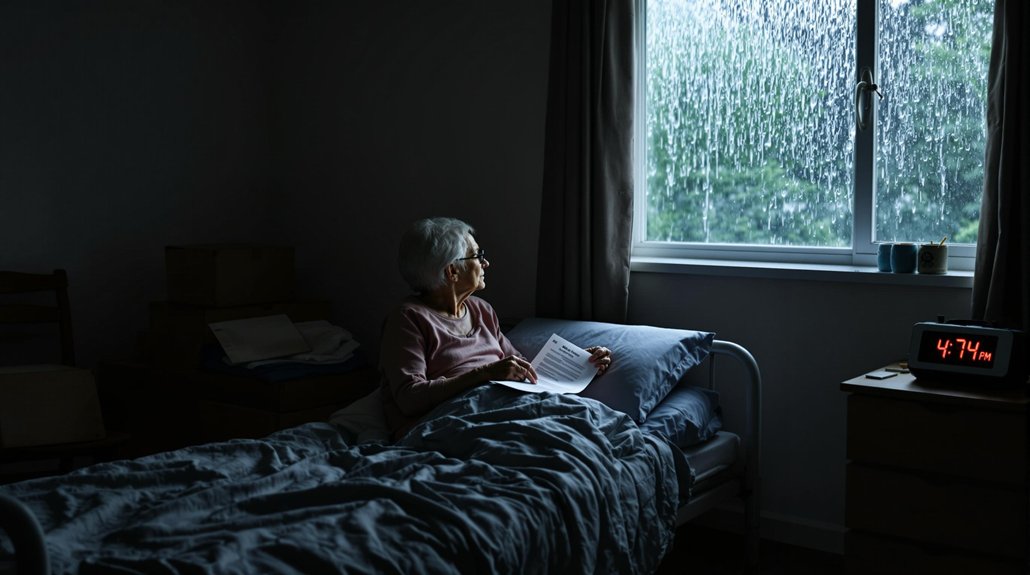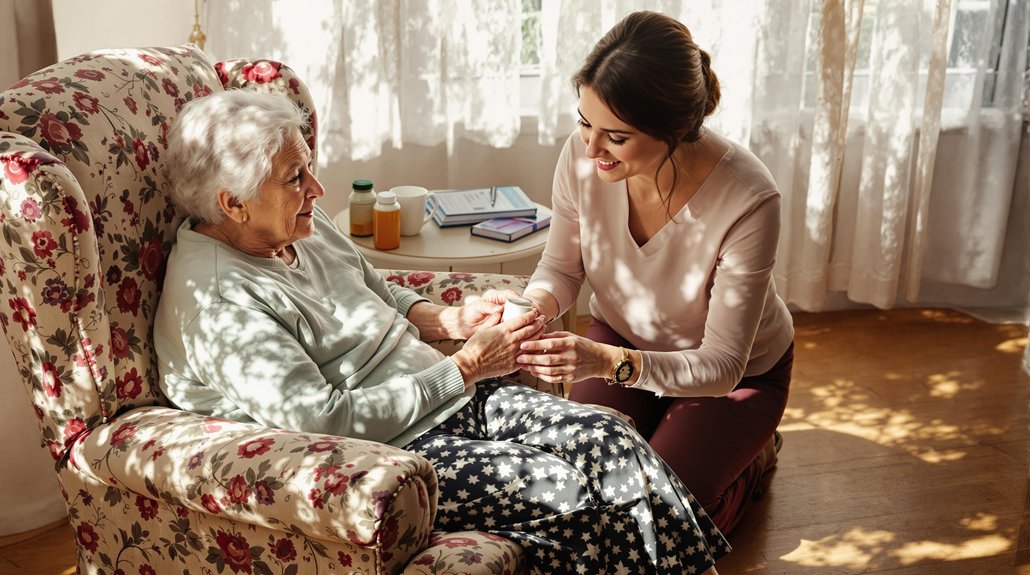Skilled care and personal care serve distinct needs in your healthcare journey. Skilled care involves licensed medical professionals like nurses and therapists who perform complex medical procedures and treatments following strict protocols. Personal care focuses on helping you with daily living activities such as bathing, dressing, and meal preparation through trained caregivers. While skilled care typically costs more, it often has broader insurance coverage options. Understanding these key differences will help you make informed decisions about your care needs.
Defining Skilled Care: Medical Expertise and Specialized Training
Healthcare professionals delivering skilled care possess advanced medical training and professional certifications that enable them to perform complex medical procedures and treatments. These medical professionals include registered nurses, physical therapists, occupational therapists, and speech pathologists who’ve completed rigorous education programs and earned necessary licenses.
You’ll find that skilled care providers use specialized skills to manage medical conditions, monitor essential signs, administer medications, and perform wound care. They’re qualified to operate medical equipment, provide post-surgical care, and develop extensive treatment plans.
Their expertise allows them to recognize subtle changes in a patient’s condition and make critical medical decisions. If you’re seeking skilled care, you can trust these professionals to deliver evidence-based treatments while following strict medical protocols and maintaining detailed clinical documentation of your progress. Perioperative care services ensure comprehensive support before and after surgery to facilitate optimal recovery outcomes.
Understanding Personal Care: Essential Daily Support
While skilled care focuses on medical treatments, personal care encompasses the fundamental assistance needed for daily living activities.
You’ll find that personal care providers help individuals maintain their dignity and independence through essential support with daily routines. This includes assistance with personal hygiene tasks like bathing, grooming, and dressing.
Personal care also involves helping with basic mobility, meal preparation, and light housekeeping.
Essential daily support includes assistance with movement, preparing nutritious meals, and maintaining a tidy living space.
These caregivers guarantee their clients can safely perform everyday activities while maintaining a comfortable living environment.
Though they don’t provide medical services, personal care workers play an important role in supporting overall well-being by helping individuals stay clean, nourished, and engaged in their regular routines.
Their compassionate support allows people to live comfortably in their preferred setting while maintaining quality of life.
Through companion care services, caregivers enhance independence while ensuring comfort in the familiar surroundings of home.
Key Differences in Service Delivery and Scope
The fundamental delivery of skilled care and personal care reveals distinct operational differences in their scope of practice. You’ll find that service delivery methods vary greatly between these two types of care, particularly in their requirements and implementation.
| Aspect | Skilled Care | Personal Care |
|---|---|---|
| Provider Type | Licensed medical professionals | Trained caregivers |
| Care Scope | Medical procedures & rehabilitation | Daily living assistance |
| Documentation | Detailed medical records | Basic care logs |
When examining care scope differences, you’ll notice that skilled care involves complex medical procedures and therapies requiring specialized training, while personal care focuses on essential daily tasks. The service delivery model for skilled care typically follows strict medical protocols, whereas personal care allows for more flexibility in scheduling and task execution to meet individual needs. At Focus Family Care, skilled nursing services are delivered through customized care plans designed to address unique health care requirements.
Qualifications and Licensing Requirements
Professional requirements for skilled care and personal care workers reflect significant differences in their educational pathways and regulatory oversight.
You’ll find that skilled care providers must meet strict licensing criteria and undergo extensive training, while personal care workers typically face fewer formal requirements.
- Skilled care providers need state-issued licenses, advanced degrees or certifications, and must complete rigorous certification processes, often including clinical hours and continuing education.
- Personal care workers generally require basic training, a high school diploma, and completion of state-mandated courses focused on safety and caregiving fundamentals.
- Both roles have background check requirements, but skilled care providers face additional scrutiny through professional boards and regulatory agencies.
Understanding these qualifications helps you choose the right type of care provider and guarantees you’re working with properly credentialed professionals for your specific needs.
Quality assurance measures are regularly implemented to ensure both skilled and personal care providers maintain high standards of service delivery.
Cost Considerations and Insurance Coverage
Significant financial differences exist between skilled care and personal care services, particularly when it comes to insurance coverage and out-of-pocket expenses.
When you’re conducting a cost analysis, you’ll find that skilled care typically costs more but often receives broader insurance coverage through Medicare, Medicaid, and private health insurance plans.
Personal care services usually come at a lower hourly rate but aren’t typically covered by Medicare. You’ll need to explore various insurance options, including long-term care insurance or Medicaid waiver programs, to help offset these expenses.
While skilled care might range from $200-400 per day in a facility setting, personal care could cost $20-30 per hour for in-home services.
Remember that combining both types of care could impact your overall expenses and insurance coverage limits.
Our experienced billing staff can help explain your benefits and verify eligibility for various insurance coverage options.
Settings Where Care Is Provided
Both skilled care and personal care services can be delivered across various healthcare settings, though each type has its typical environments.
Understanding where you’ll receive care helps you make informed decisions for yourself or your loved ones.
- Skilled care is commonly provided in rehabilitation centers, specialized nursing facilities, and through home health agencies that bring licensed medical professionals to your residence.
- Personal care frequently takes place in assisted living communities, private homes, and adult day care centers where caregivers focus on non-medical support.
- You’ll find both types of care in continuing care retirement communities (CCRCs), which offer multiple levels of support under one roof.
The setting you choose should align with your medical needs, lifestyle preferences, and the level of independence you want to maintain.
Duration and Intensity of Care Services
While medical circumstances vary for each individual, skilled care and personal care follow distinctly different patterns in their timing and intensity.
Skilled care tends to be short-term and intensive, typically lasting a few weeks or months while you recover from a specific medical condition or surgery. You’ll receive concentrated attention from medical professionals who work to achieve clearly defined recovery goals.
Personal care, however, often involves duration variations based on your long-term needs, which may extend for years or indefinitely.
The intensity factors for personal care usually remain consistent, with regular daily or weekly assistance for routine activities. You might receive help for a few hours each day or around-the-clock support, depending on your requirements.
Your personal care schedule can also be adjusted as your needs change over time.
Assessing Which Type of Care You Need
Understanding which type of care fits your situation requires a thoughtful evaluation of your medical needs and daily living requirements. A thorough needs assessment will help determine whether you need skilled care, personal care, or a combination of both.
Choosing the right care involves careful assessment of your health needs to match you with skilled, personal, or combined care services.
When conducting your care evaluation, consider these key factors:
- Your medical conditions and whether they require specialized nursing, therapy, or rehabilitation services that only licensed healthcare professionals can provide.
- Your ability to perform basic daily tasks like bathing, dressing, eating, and mobility – and whether you need hands-on assistance with these activities.
- The level of supervision and support you need to maintain your safety and well-being at home or in a care facility.
Work with your healthcare provider and family to assess these aspects and make an informed decision about your care needs.
The Role of Care Coordination and Management
Since coordinating multiple types of care can be complex, effective care management becomes essential for ensuring seamless delivery of services.
Whether you’re managing skilled nursing care, personal care assistance, or both, you’ll need to develop clear management strategies to maintain quality and consistency.
Care coordination involves organizing all aspects of a person’s care plan, from scheduling appointments to monitoring medication adherence.
You’ll need to communicate effectively with healthcare providers, family members, and caregivers while tracking progress and adjusting services as needs change.
It’s important to establish a system for documenting care activities, maintaining records, and sharing information among all involved parties.
If you’re overseeing both skilled and personal care services, consider using digital tools or professional care managers to help streamline the process and prevent gaps in care delivery.
Future Planning and Transitioning Between Care Types
As health needs evolve over time, planning ahead for changes between different levels of care becomes essential.
You’ll need to anticipate future needs and prepare for smooth care shifts to guarantee continuous support for yourself or your loved one.
When planning for changes between skilled care and personal care, consider these key aspects:
- Create a detailed timeline for anticipated care shifts, including triggers that might necessitate moving from one level to another.
- Research and establish relationships with potential care providers before you need them, making the switch easier when the time comes.
- Maintain clear documentation of medical history, preferences, and care requirements to help new providers deliver consistent care.
Conclusion
Skilled care and personal care work together like two helping hands – one for medical needs and one for daily living support. Think of skilled care as the nurse who changes bandages and monitors vital signs, while personal care is like a trusted friend who helps with bathing, dressing, and meals. Knowing which type of care you need is important for getting the right help at the right time.
Remember, you’re not walking this path alone. Many families face these same care decisions, and it’s okay to ask for guidance. Our team at Focus Family Care understands your concerns and is ready to help you find the perfect care solution for your situation.
If you or a loved one need help, don’t wait. Reach out to Focus Family Care today at (561) 693-1311 or email us at info@focusfamilycare.com.





